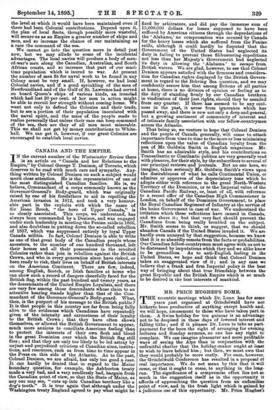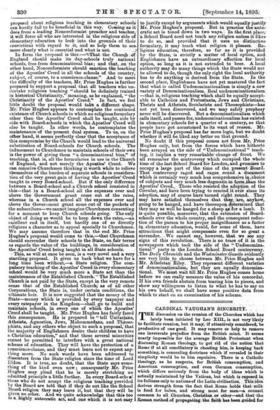MR. PRICE HUGHES'S BOMB. T HE eccentric meetings which Dr. Lunn
has for some years past organised at Grindelwald have not hitherto been productive of anything except health and, we will hope, amusement to those who have taken part in them. A Swiss holiday for ten guineas is an advantage not to be despised in these days of lowered interest and falling tithe ; and if it pleases Dr. Lunn to take as part- payment for the boon the right of arranging for evening lectures and Sunday sermons, no one has any right to complain. We can imagine pleasanter and more profitable ways of seeing the Alps than in conjunction with the unfruitful chatter that the holiday-maker ought at least to wish to leave behind him ; but then, we must own that they would probably be more costly. For once, however. the Grindelwald Conference has resulted in a proposal of real importance. We do not mean by this that it will come, or that it ought to come, to anything in the long. run. The significance of a compromise often lies not so much in the suggestion itself as in the opportunity it affords of approaching the question from an unfamiliar point of view, and in the fresh light which is gained by a judicious use of this opportunity. Mr. Price Hughes's proposal about religious teaching in elementary schools can hardly fail to be beneficial in this way. Coming as it does from a leading Nonconformist preacher and teacher, it will force all who are interested in the religious side of elementary education to look into the grounds of their convictions with regard to it, and so help them to see. more clearly what is essential and what is not.
In form the proposal is this That the Church England should make its day-schools truly national schools, free from denominational bias ; and that, on the other hand, Nonconformists should sanction the, teaching of the Apostles' Creed in all the schools of the country, subject, of course, to a conscience-clause." And to meet the difficulty of the teachers, Mr. Price Hughes is further prepared to support a proposal that all teachers who un- dertake religious teaching " should be definitely trained in historical Christianity," meaning, as he explained, " the Christianity of the Apostles' Creed." In fact, we feel little doubt the proposal would take a different shape. Mr. Price Hughes appears to contemplate the continued existence of Church schools in which no religious formulary other than the Apostles' Creed shall be taught, side by side with Board-schools in which the Apostles' Creed will also be taught. In other words, he contemplates the maintenance of the present dual system. To us, on the ()tiler hand, it seems perfectly clear that the acceptance of this compromise by the Church would lead to the universal substitution of Board-schools for Church schools. The inducement to Churchmen to maintain schools of their own is the power of giving them " a denominational bias," of teaching, that is, all the formularies in use in the Church of England, and not merely the Apostles' Creed. We can conceive Churchmen thinking it worth while to relieve themselves of the burden of separate schools in considera- tion of the very great gain of having the Apostles' Creed taught in every Board-school. But if the, only difference between a Board-school and.a Church school consisted in this—that in a Board-school all the expenses over and above the Government grant come out of the rates, whereas in a Church school all the expenses over and above the Government grant come out of the pockets of the subscribers—we cannot imagine Churchmen con sentin g for a moment to keep Church schools going. The only object of doing so would be to keep down the rates,—an excellent end in itself, but hardly one of so directly religious a character as to appeal specially to Churchmen. We may assume therefore that in the end Mr. Price Hughes's proposal would come to this,—that Churchmen should surrender their schools to the State, on fair terms as regards the value of the buildings, in consideration of the Apostles' Creed being taught in all State schools.
This, as will at once be seen, is a very novel and a very startling proposal. It gives us back what we have for a long time been without,—a State religion. The com- pulsory teaching of the Apostles' Creed in every elementary school would be very much more a State act than the maintenance of the Established Church.--The Established Church is not paid by the State, except in the very remote sense that of the Established Church; as of all other Corporations, the State is, under certain conditions, the ultimate heir. It is now suggested that the money of the State—money which is provided by every taxpayer and every ratepayer in the Kingdom—shall go to build and maintain schools, in every one of which the Apostles' Creed shall be taught. Mr. Price Hughes has fairly faced this consequence. He is prepared to " tell lJnitaria.ns, Atheists, Agnostics, Jews, Mahommedans, and Theoso- phists, and any others who object to such a proposal; that the majority of Englishmen desire their children to have a Christian education," and that these several minorities cannot be permitted to interfere with a great national scheme of education. They will have the protection of a. conscience-clause, and they must learn not to expect any- thing more. No such words have been addressed to dissenters from the State religion since the time of Lord Eldon. It is true, no doubt, that the State says some- thing of the kind even now ; consequently Mr. Price Hughes may plead that he is merely stretching an admitted principle a little further. In every Board-schcol those who do not accept the religious teaching provided by the Board are told that if they do not like the School Board religion they may leave it, but that they will be given no other. And we quite acknowledge that this too is a highly autocratic act, and one which it is not easy to justify except by arguments which would equally justify Mr. Price Hughes's proposal. But in practice the auto- cratic act is toned down in two ways. In the first place, a School Board need not teach any religion unless it likes to do so, and provided that it uses no distinctive formulary, it may teach what religion it pleases. Re- ligious education, therefore, so far as it is provided by the State, is strictly a matter of local option, and Englishmen have an extraordinary affection for local option, so long as it is not extended to beer. A local authority may do many things which the State would not be allowed to do, though the only right the local authority has to do anything is derived from the State. In the second place, Englishmen have not yet mastered the fact that what is called Undenominationalism is simply a new variety of Denominationalism. Real undenominationalism. —that is, religious teaching which shall be equally accept- able to Catholics and Protestants, Jews and Christians, Theists and Atheists, Secularists and Theosophists—has not yet been discovered, and we may safely prophesy never will be discovered. But a denominationalism which calls itself, and passes for, undenominationalism has existed in elementary schools for a quarter of a century, so that people have got accustomed to its want of reason. Mr. Price Hughes's proposal has far more logic, but we doubt whether it will be liked any better on that ground. No doubt if this proposal comes not from Mr. Price Hughes only, but from the forces which have hitherto been arrayed on the side of " Undenoruinational " teach- ing, it implies a very- remarkable' change-of front. We all remember the controversy which occupied the whole time of the last School Board for London, and ,promises to occupy a large part of the time of the _present' Board. That controversy raged and rages_ round a document which is certainly very much less comprehensive iniehoice of subjects and very much less-dogmatic-in form4han the Apostles' Creed., Those who resisted the adoption of the Circular, and have been trying to rescind it ever since its adoption, may of course haVe turned right round. They may have satisfied themselves •that they, are, anyhow, going to be hanged, and have thereupon -determined that they may as well be hanged• for a sheep as.for a lamb. It is quite possible, moreover, that the extension of Board- schools over the whole country, and the consequent reduc- tion of the parson to his proper insignificance as a factor in_ elementary education, would, for some of them, have attractions that might compensate even for so great a surrender. - We cannot say, however, that we see any signs of this revolution.. There is no trace -of it in the newspapers which took the side of the " lindenomina- tional " party in the London School Board controversy. The Daily Chronicle and the Westminster. Gazette evidently see very little to choose between Mr. Price Hughes and Mr. Athelstan Riley. They represent different varieties of denominationalism, but they are equally denomina- tional. We must wait till Mr. Price Hughes comes home before we can really measure the value of his concordat. If his own friends abstain from tearing him to pieces, and show any willingness to listen to what he has to say on his own behalf, we shall have some positive data from which to start on an examination of his scheme.



































 Previous page
Previous page